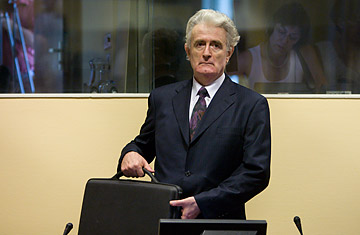
Former Bosnian Serb leader Radovan Karadzic during his initial appearance at the International Criminal Tribunal for the Former Yugoslavia on July 31, 2008, in the Hague
Fast Facts:
• Born in a stable to a poor family in Savnik, Montenegro (then part of Yugoslavia), in 1945. His father was a member of the Chetniks, the remnants of the army of the Kingdom of Yugoslavia, and was wounded in World War II while fighting Nazi occupiers.
• Moved to Sarajevo to study medicine in 1960. Karadzic took up the bohemian lifestyle, writing poetry and mingling with writers and artists while living in ethnically mixed Sarajevo. In 1967 he met Dobrica Cosic, a Serbian writer and politician, who urged Karadzic to become politically active.
• After graduating with a medical degree in 1971, he worked at a psychiatric clinic and then became a psychologist for a soccer team in Sarajevo. He also received training in psychotherapy in Croatia in 1980.
• During the '70s, he earned extra money by selling fraudulent medical diagnoses. In 1985, Karadzic was sentenced to three years in prison for unrelated charges of fraud and embezzlement of public property — on which he built a house for his family — for his work with construction executive Momcilo Krajisnik. Received time served for the 11 months he was in prison prior to the conviction and did not have to return.
• In 1990 he created the Serbian Democratic Party (SDS), which under his leadership resisted Bosnia's independence and suppressed other ethnic groups.
• Karadzic declared himself the new leader of the Serbian Republic of Bosnia and Herzegovina in 1992, with Sarajevo as its capital, and instituted his plan to "ethnically cleanse" Serbia. "More the foreman than the architect [that distinction belonged to Yugoslavian President Slobodan Milosevic] of the worst massacres in Europe since World War II," as TIME's Massimo Calabresi wrote in 2008, Karadzic allegedly ordered the siege of Sarajevo, which killed at least 10,000 people, and the slaughter at Srebrenica in 1995, which killed more than 7,000 Muslim men and boys.
• Karadzic and his army chief, Ratko Mladic, were indicted by the U.N.'s International Criminal Tribunal for genocide, crimes against humanity and violations of the laws or customs of war in July 1995. One year later, he was forced to resign as president of SDS and went into hiding.
• While on the run, he was protected by 80 armed men and was able to visit his wife regularly; in 2004 he published Miraculous Chronicles of the Night, a novel set in 1980s Yugoslavia, which won a Serbian book prize. A year later he released a book of poems, Under the Left Breast of the Century.
• When he was arrested in Belgrade in July 2008, he was living under an alias as a New Age healer and had grown a thick, long white beard to match his shock of white hair.
Quotes By:
• "I would [not] and never will boycott my trial, but if I am not prepared, that would not be a trial at all." — In a letter dated Oct. 23 and released after the trial proceedings began, in which Karadzic claimed he was not given enough time to read hundreds of documents to prepare his case. (AP, Oct. 26, 2009)
• "You want to take Bosnia and Herzegovina down the same highway to hell and suffering that Slovenia and Croatia are traveling. Do not think that you will not lead Bosnia and Herzegovina into hell, and do not think that you will not perhaps lead the Muslim people into annihilation because the Muslims cannot defend themselves if there is war. How will you prevent everyone from being killed in Bosnia and Herzegovina?" — Speaking before the Bosnian Parliament in October 1991 during a debate over whether to declare the Serb Republic sovereign. (The Serbs: History, Myth and the Destruction of Yugoslavia, Yale University Press, 1997)
• "Let's go down to the cities to kill the scumbags." — A stanza of one of his poems about Sarajevo. (Independent, July 25, 2008)
• "If the Hague was a real judicial body, I would be ready to go there to testify or do so on television, but it is a political body that has been created to blame the Serbs." — In an interview with the Times of London shortly before he went into hiding in 1996.
Quotes About:
• "Radovan Karadzic is making the world and justice ridiculous. He is joking with everybody." — Admira Fazlic, a woman who was imprisoned in Bosnian Serb–run camps during the conflict. (New York Times, Oct. 26, 2009)
• "One of the worst men in the world, the Osama bin Laden of Europe, has finally been captured." — Richard Holbrooke, U.S. diplomat, who brokered the Dayton Peace Agreement for Bosnia in 1995, on the arrest of Karadzic after Karadzic's almost 12 years on the run. (CNN, July 22, 2008)
• "He was eloquent and a bit strange, like a true bohemian." — Goran Kojic, editor of Belgrade magazine Healthy Life, on being fooled by Karadzic's disguise as a New Age healer. Karadzic freelanced for the publication while hiding from authorities. (AP, July 23, 2008)
• "I am proud how he has been hiding all these years, and I am appalled how he was thrown in the jaws of the beast." Momir Vasiljevic, writer, after Serbia handed Karadzic over to the U.N. War Crimes Tribunal. (AP, July 30, 2008)
• "Instead of hiding in a pit like Saddam Hussein, he is writing books." — Florence Hartmann, spokeswoman for top U.N. war-crimes prosecutor Carla del Ponte. (BBC, Oct. 18, 2005)
• "If I was in Karadzic's shoes, I would opt for a drastic solution. One such solution is suicide." — Serb Republic President Dragan Cavic in 2004 as authorities were negotiating the surrender of former military chief Ratko Mladic and speculating that Karadzic was hiding in the country. (Time.com, July 18, 2004)
